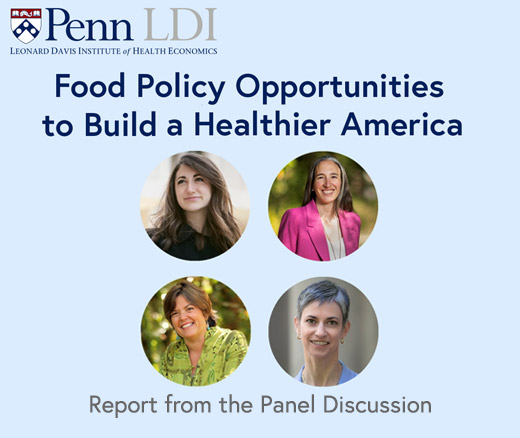
Heart Failure Patients May Get Sicker When the Rent Is Too High
Cheaper Housing Could be a Way to Lower Hospitalizations Among Medicaid Patients with Heart Failure
Population Health
Blog Post

For families struggling with food insecurity, the Special Supplemental Nutrition Program for Women, Infants, and Children (WIC) and Supplemental Nutrition Assistance Program (SNAP) are lifelines. Both programs provide critical support, yet barriers prevent many eligible families from accessing or fully using them.
To address these challenges, a novel study conducted by LDI Senior Fellows Chén Kenyon, Alexander Fiks, Aditi Vasan, and colleagues sought to capture firsthand insights from caregivers of young patients who use or have used WIC and SNAP. As one of the first studies to examine experiences with both programs, it highlights the benefits and obstacles caregivers face and offers a range of their solutions for improving WIC and SNAP.
The research team conducted in-depth semistructured phone interviews with 40 caregivers from Philadelphia’s low-income communities—predominantly Black and Medicaid-insured mothers with young children. Caregivers shared their lived experiences with WIC and SNAP, describing both the support these programs provide and the frustrations they produce. From managing food restrictions to encountering stigma, caregivers painted a detailed picture of their daily challenges while using these essential support systems. Their insights underscore the importance of addressing structural barriers in both programs and making practical, caregiver-informed policy changes.
Below we distill the study’s most critical findings while offering policy recommendations for enhancing these vital programs.
Caregivers greatly valued WIC’s provision of nutritious food and breastfeeding support. Many noted that WIC benefits encouraged them to make healthier choices for their families. However, WIC’s product restrictions may limit or discourage participation. Many caregivers expressed frustration with WIC’s stringent product criteria, such as rigid size and brand limitations, which can be especially challenging during crises like the formula shortage. These restrictions often deter families from fully using WIC benefits. In contrast, SNAP offers greater flexibility in food choice, allowing families to meet specific dietary needs without the same constraints.
Policy Opportunity: Consider enhancing WIC’s flexibility in food selection to meet diverse dietary needs without compromising nutritional goals, following SNAP’s example of promoting the families’ autonomy in food choice. WIC’s recent food package changes, which allow the program to cover a broader range of whole grain products, are an important step in this direction. Also streamline WIC’s product guidelines, allowing more accessible substitutions during shortages and increased accommodation of specific dietary needs, such as food allergies.
Redeeming WIC benefits can be an uncomfortable experience. Caregivers reported challenges in identifying WIC-eligible products and often experienced stigmatizing interactions at checkout. The lack of consistent labeling for WIC items contributes to frustration. Across both WIC and SNAP, caregivers encountered stigma, especially during enrollment and in-office interactions. Many participants emphasized the need for respectful treatment and streamlined processes to reduce the feeling of being “othered” while seeking assistance.
Policy Opportunity: Standardize WIC product labeling nationwide to ease shopping challenges and reduce stigma. Policymakers might also consider exploring discreet, tech-based solutions that streamline checkout. Additionally, train caseworkers and program administrators to have sensitive, supportive interactions and assess ways to make enrollment settings more welcoming and accessible.
The income cutoffs for SNAP eligibility prevented some caregivers from accessing benefits, despite facing food insecurity. Families on the financial edge often find themselves just above eligibility thresholds, which do not consider high costs of living and essential expenses.
Policy Opportunity: Review and adjust income eligibility criteria to better reflect the economic realities of working families, potentially incorporating factors like rent and utilities into eligibility determinations.
Navigating SNAP enrollment and recertification can be daunting. Caregivers cited unexpected loss of benefits due to complex paperwork and frequent errors in processing, which put them at risk of losing vital support.
Policy Opportunity: Simplify recertification, consider extending renewal periods, and implement automated notifications to minimize the administrative burden on caregivers.
Caregivers expressed enthusiasm for online enrollment and mobile app-based benefit management, finding these options less stigmatizing and more convenient. For instance, the WIC app helps families track eligible items and updates.
Policy Opportunity: Expand online enrollment, virtual support options, and app-based benefit tracking for both WIC and SNAP. These tools provide accessible alternatives for families facing logistical barriers to in-person benefits enrollment and redemption.
Many caregivers suggested that enrolling in WIC and SNAP at health care facilities, such as pediatric clinics, would increase participation. Given the overlap between WIC and SNAP eligibility and families already receiving care, integrated enrollment would minimize redundant visits and simplify access.
Policy Opportunity: Launch pilot programs that embed WIC and SNAP enrollment within clinical settings, ideally facilitated by patient navigators trained in benefits access.
By highlighting these caregiver perspectives, this study underscores the importance of refining WIC and SNAP to ensure they meet families’ needs effectively and respectfully. Policymakers can make tangible improvements by addressing barriers like stigma, product restrictions, eligibility limitations, and administrative complexity. Streamlined processes and a greater focus on flexible, accessible, and dignity-focused programs can ultimately make WIC and SNAP more effective in achieving their core goal: providing consistent and equitable nutritional support to needy families.
The study, “Caregiver Perspectives on Improving Government Nutrition Benefit Programs,” was published on October 8, 2024 in Pediatrics. Authors include DanaRose Negro, Mishaal Yazdani, Lindsay Benitez, Chén C. Kenyon, Alexander G. Fiks, and Aditi Vasan.


Cheaper Housing Could be a Way to Lower Hospitalizations Among Medicaid Patients with Heart Failure

Pa.’s New Bipartisan Tax Credit is Designed to be Simple and Refundable – Reflecting Core Points From Penn LDI Researchers Who Briefed State Leaders

Announcing Bold New Goals While Crippling the Infrastructure Needed to Achieve Them

Promising New Evidence and What’s Next

From 1990 to 2019, Black Life Expectancy Rose Most in Major Metros and the Northeast—but Gains Stalled or Reversed in Rural Areas and the Midwest, Especially for Younger Adults

A Penn LDI Seminar Focuses on Why They’re Important for the Future